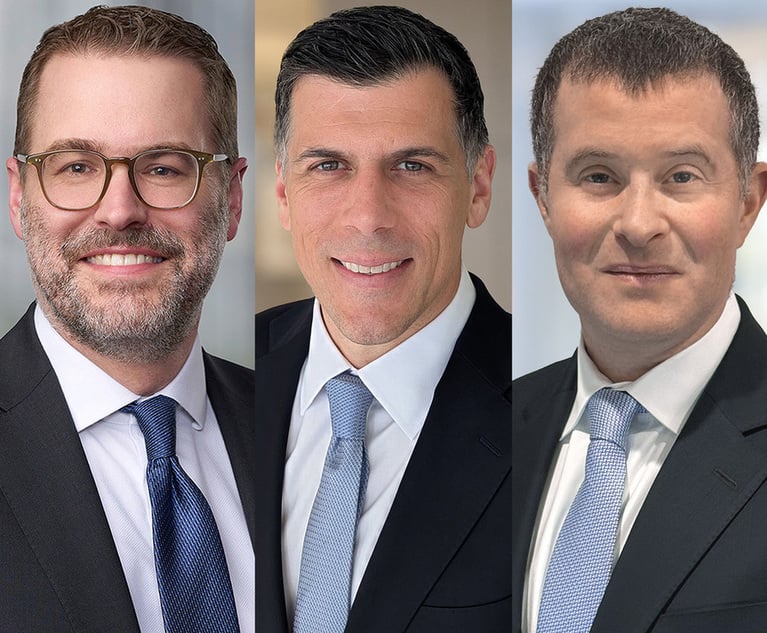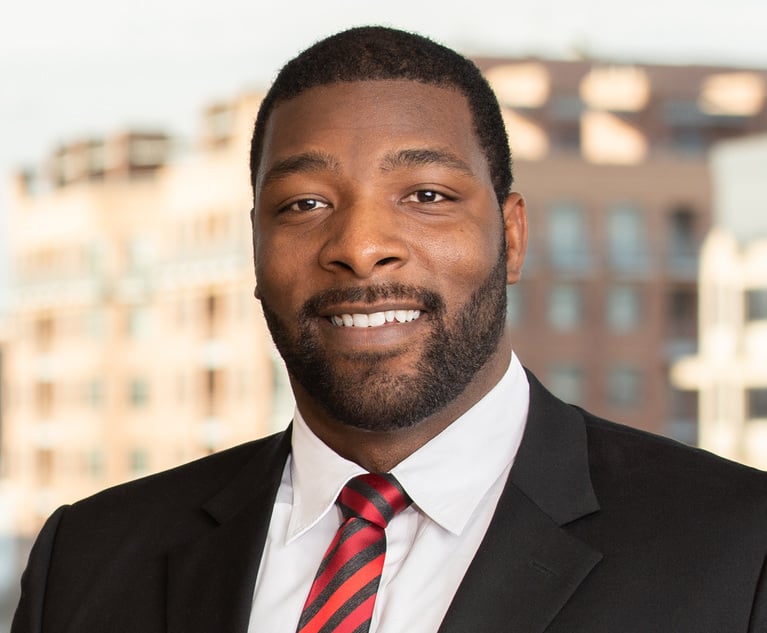Appellate Hot List 2019: McDermott Will & Emery
Paul Hughes and Michael Kimberly discuss the firm's top U.S. Supreme Court win.
October 25, 2019 at 02:30 PM
2 minute read
 Paul Hughes, left, Michael Kimberly, right.
Paul Hughes, left, Michael Kimberly, right.
Tell us about your top U.S. Supreme Court or federal appeals court victory over the past year and how you and your team achieved the win.
In Kisor v. Wilkie, we asked the Supreme Court to overrule or limit Auer [v. Robbins] deference. After granting our petition, the court unanimously reversed the court of appeals, delivering an unequivocal victory for our client. Although the justices were divided as to whether Auer should be formally overruled, all agreed with our fundamental point that Auer deference—especially in our case—was badly broken and required significant reform. Justice [Neil] Gorsuch said that Auer deference is now a "paper tiger." Kisor will require agencies to act with greater predictability and transparency.
*Arguments for Kisor v. Wilkie occurred prior to Paul Hughes and Michael Kimberly joining McDermott.
How did your firm approach appellate success over the past year?
Our appellate successes are born of teamwork. When a client hires us, we both fully commit to the cause. All of our work reflects our decade-plus of collaboration.
What is the most satisfying element of appellate practice in your opinion?
There is nothing more satisfying than achieving an outright victory that meets our client's immediate need. Better still, securing a win on appeal often means securing lasting legal change.
What's the most valuable lesson you learned as a young lawyer?
Always outwork your opponent. The best appellate lawyers roll up their sleeves to master the details of their cases. Small details can drive the outcome.
Submitted by Paul Hughes and Michael Kimberly, partners at McDermott Will & Emery.
This content has been archived. It is available through our partners, LexisNexis® and Bloomberg Law.
To view this content, please continue to their sites.
Not a Lexis Subscriber?
Subscribe Now
Not a Bloomberg Law Subscriber?
Subscribe Now
NOT FOR REPRINT
© 2025 ALM Global, LLC, All Rights Reserved. Request academic re-use from www.copyright.com. All other uses, submit a request to [email protected]. For more information visit Asset & Logo Licensing.
You Might Like
View All
Wilmer, White & Case, Crowell Among the Latest to Add DC Lateral Partners
4 minute read
Lawyers Across Political Spectrum Launch Public Interest Team to Litigate Against Antisemitism
4 minute read

Government Contracting Clients Look to Firms to Stay on Top of Trump Policy Changes
4 minute readTrending Stories
- 1States Accuse Trump of Thwarting Court's Funding Restoration Order
- 2Microsoft Becomes Latest Tech Company to Face Claims of Stealing Marketing Commissions From Influencers
- 3Coral Gables Attorney Busted for Stalking Lawyer
- 4Trump's DOJ Delays Releasing Jan. 6 FBI Agents List Under Consent Order
- 5Securities Report Says That 2024 Settlements Passed a Total of $5.2B
Who Got The Work
J. Brugh Lower of Gibbons has entered an appearance for industrial equipment supplier Devco Corporation in a pending trademark infringement lawsuit. The suit, accusing the defendant of selling knock-off Graco products, was filed Dec. 18 in New Jersey District Court by Rivkin Radler on behalf of Graco Inc. and Graco Minnesota. The case, assigned to U.S. District Judge Zahid N. Quraishi, is 3:24-cv-11294, Graco Inc. et al v. Devco Corporation.
Who Got The Work
Rebecca Maller-Stein and Kent A. Yalowitz of Arnold & Porter Kaye Scholer have entered their appearances for Hanaco Venture Capital and its executives, Lior Prosor and David Frankel, in a pending securities lawsuit. The action, filed on Dec. 24 in New York Southern District Court by Zell, Aron & Co. on behalf of Goldeneye Advisors, accuses the defendants of negligently and fraudulently managing the plaintiff's $1 million investment. The case, assigned to U.S. District Judge Vernon S. Broderick, is 1:24-cv-09918, Goldeneye Advisors, LLC v. Hanaco Venture Capital, Ltd. et al.
Who Got The Work
Attorneys from A&O Shearman has stepped in as defense counsel for Toronto-Dominion Bank and other defendants in a pending securities class action. The suit, filed Dec. 11 in New York Southern District Court by Bleichmar Fonti & Auld, accuses the defendants of concealing the bank's 'pervasive' deficiencies in regards to its compliance with the Bank Secrecy Act and the quality of its anti-money laundering controls. The case, assigned to U.S. District Judge Arun Subramanian, is 1:24-cv-09445, Gonzalez v. The Toronto-Dominion Bank et al.
Who Got The Work
Crown Castle International, a Pennsylvania company providing shared communications infrastructure, has turned to Luke D. Wolf of Gordon Rees Scully Mansukhani to fend off a pending breach-of-contract lawsuit. The court action, filed Nov. 25 in Michigan Eastern District Court by Hooper Hathaway PC on behalf of The Town Residences LLC, accuses Crown Castle of failing to transfer approximately $30,000 in utility payments from T-Mobile in breach of a roof-top lease and assignment agreement. The case, assigned to U.S. District Judge Susan K. Declercq, is 2:24-cv-13131, The Town Residences LLC v. T-Mobile US, Inc. et al.
Who Got The Work
Wilfred P. Coronato and Daniel M. Schwartz of McCarter & English have stepped in as defense counsel to Electrolux Home Products Inc. in a pending product liability lawsuit. The court action, filed Nov. 26 in New York Eastern District Court by Poulos Lopiccolo PC and Nagel Rice LLP on behalf of David Stern, alleges that the defendant's refrigerators’ drawers and shelving repeatedly break and fall apart within months after purchase. The case, assigned to U.S. District Judge Joan M. Azrack, is 2:24-cv-08204, Stern v. Electrolux Home Products, Inc.
Featured Firms
Law Offices of Gary Martin Hays & Associates, P.C.
(470) 294-1674
Law Offices of Mark E. Salomone
(857) 444-6468
Smith & Hassler
(713) 739-1250








